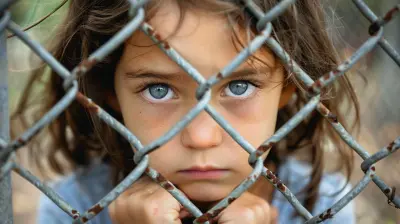The Importance of Emotional Intelligence in Childhood Development
22 May 2025
Let’s be real—raising little humans is like trying to herd a bunch of caffeinated squirrels. One minute they’re giggling uncontrollably, the next they’re crying because their sock is “too socky.” Parenthood is a wild ride, and honestly, half the time, we’re just winging it.
But here’s the thing: amidst the chaos of snack requests and bedtime battles, one of the most important skills we can help our kids develop isn’t just reading or counting—it’s emotional intelligence (EI). And no, that’s not just some fancy term therapists throw around; it’s the secret sauce to raising kind, confident, and resilient kids.
So, grab your coffee (or leftover juice box from your toddler’s untouched lunch), and let’s dive into why emotional intelligence is a game-changer in childhood development. 
What Even Is Emotional Intelligence?
In simple terms, emotional intelligence is the ability to recognize, understand, and manage emotions—both in yourself and in others. Think of it as the Jedi mind trick of social skills. A kid with high emotional intelligence can handle playground drama, express their feelings without throwing a tantrum (most of the time), and empathize with others.Psychologist Daniel Goleman, who basically put EI on the map, breaks it down into five key components:
1. Self-awareness – Knowing what you’re feeling
2. Self-regulation – Managing emotions, instead of letting them explode like a shaken soda
3. Motivation – Pushing through challenges without giving up
4. Empathy – Understanding how others feel
5. Social skills – Playing nicely with others (a huge win for parents of siblings)
Now, you might be thinking, “That all sounds great, but why does this matter for my kid?” Glad you asked. 
Why Emotional Intelligence Matters for Kids
1. Better Emotional Regulation = Fewer Meltdowns
Every parent knows the horror of a mid-store tantrum. One second, you're browsing cereal; the next, your kid is on the floor because you grabbed the blue box instead of the red one. (The horror!)Kids with strong emotional intelligence learn to handle frustration, disappointment, and anger without turning into a tiny, screaming tornado. They understand their feelings and can express them in healthier ways—like using words instead of launching their shoes across the room.
2. Stronger Friendships (a.k.a. Fewer Recess Dramas)
Let’s face it—childhood friendships can be dramatic. One minute, they’re besties; the next, they’re “never speaking again” because someone sat in the wrong seat at lunch.Emotional intelligence helps kids navigate the ups and downs of social interactions. When they can recognize other people’s emotions and respond with kindness, they’re more likely to build strong, lasting friendships. Plus, fewer friendship squabbles mean fewer times you have to play referee.
3. Improved Academic Success
Believe it or not, emotional intelligence isn’t just for social situations—it also affects how kids perform in school. A child who can manage frustration is way more likely to stay focused when homework gets tricky. And kids who can communicate their thoughts effectively tend to do better in group projects and classroom discussions.In fact, research shows that EI is a better predictor of success than traditional IQ. So, while flashcards and math drills are great, helping your child develop emotional intelligence might be the secret weapon to their academic growth.
4. Resilience in Tough Situations
Life isn’t all sunshine and lollipops. Kids will face setbacks—maybe they’ll lose a soccer game, struggle with a test, or have a fight with a friend. Emotional intelligence helps them bounce back instead of crumbling under pressure.Think of it like an emotional immune system—the stronger it is, the better they can handle life’s curveballs without falling apart.
5. A Happier, Healthier Future
Want to know a secret? Emotional intelligence isn’t just about childhood—it’s a skill they’ll use for life. Adults with high EI tend to have healthier relationships, better job prospects, and overall greater life satisfaction. Basically, by teaching your child EI now, you’re setting them up for long-term success. (Go, you!)
How to Boost Your Kid’s Emotional Intelligence
Alright, now that we know why EI is important, how can we actually help our kids develop it? Here are some fun and simple ways:1. Name Those Feelings
Kids don’t automatically know how to express emotions. Instead of saying, “Stop crying,” try, “I see you’re upset because your block tower fell over. That must be frustrating.”Helping kids put words to their emotions makes it easier for them to express themselves without melting down.
2. Be Their Emotion Coach
When your child is frustrated, guide them through it instead of brushing it off. Instead of, “You’re fine,” try, “I know you’re upset. Let’s take some deep breaths together.”By modeling how to handle emotions, you’re teaching them coping skills they can use for life.
3. Encourage Empathy
Empathy is like a muscle—it gets stronger the more you use it. Read books that explore emotions, talk about characters' feelings, and encourage your child to consider how others might feel in different situations.For example, if they grab a toy from a sibling, ask, “How do you think that made her feel?” Small moments like this add up!
4. Praise Emotional Wins
Just like you celebrate when your child learns to ride a bike, celebrate when they handle emotions well. “Wow, I saw how you calmed yourself down instead of getting mad—that was amazing!” Positive reinforcement goes a long way.5. Model Emotional Intelligence Yourself
Here’s the hard part: Kids learn by watching us. If we lose our temper over spilled milk, they’ll do the same. But if we model patience, empathy, and self-regulation, they’ll pick up on those habits, too.So, the next time you’re about to snap, take a deep breath and show your child how to handle stress with grace. (Easier said than done, I know.) 
Final Thoughts
Raising emotionally intelligent kids isn’t about perfection (thank goodness, because we’re all just trying our best). It’s about teaching them to recognize their emotions, manage them in healthy ways, and connect with others.The more we help our kids understand their feelings, the more confident, compassionate, and resilient they’ll become. And honestly? That’s way more valuable than memorizing multiplication tables.
So, let’s embrace the messy, beautiful process of raising emotionally intelligent kids—because the world needs more kind, empathetic little humans.
all images in this post were generated using AI tools
Category:
Education TipsAuthor:

Max Shaffer
Discussion
rate this article
4 comments
Victoria Kane
Thank you for highlighting emotional intelligence's role in childhood! Nurturing these skills early truly shapes empathetic and resilient future adults.
June 21, 2025 at 2:50 AM

Max Shaffer
Thank you for your thoughtful comment! I completely agree—early emotional intelligence development lays the foundation for empathy and resilience in adulthood.
Siena Moses
Emotional intelligence in childhood cultivates resilience, empathy, and strong relationships. By nurturing children's ability to understand and manage emotions, we equip them with essential life skills that contribute to their overall well-being and success, both personally and socially, throughout their lives.
May 31, 2025 at 3:01 PM

Max Shaffer
Thank you for highlighting the vital role of emotional intelligence in childhood development. Nurturing these skills truly lays the foundation for resilience and strong relationships, which are essential for overall well-being and success.
Soliel Shaffer
Emotional intelligence is crucial for children's development, fostering empathy, resilience, and effective communication—skills vital for lifelong success and well-being.
May 29, 2025 at 3:55 AM

Max Shaffer
Thank you for your thoughtful comment! I completely agree—emotional intelligence is indeed foundational for children's growth and success in all areas of life.
Valeria Middleton
Emotional intelligence is crucial for childhood development, fostering empathy, resilience, and effective communication, which are essential skills for future success.
May 26, 2025 at 3:03 AM

Max Shaffer
Thank you for highlighting the vital role of emotional intelligence in childhood development! It's indeed foundational for nurturing skills that lead to lifelong success.



